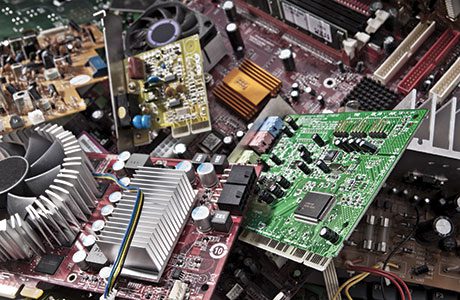
A panel discussion at the Resource & Waste Management show in September looked at progress and challenges with recycling materials recovered from electronic equipment
THERE was much talk at this session about how to get valuable or recyclable materials out of equipment like laptops and mobile phones, once it’s reach the end-of-life stage.
Kirstie McIntyre of HP said her company had been running a design-for-environment programme for the past 15 years, one of the fruits of which had been a reduction in the number of different plastics put into products, from 200 to six. With fewer materials it’s easier to take them out and sort them for recovery. HP has also spent a lof of time with recyclers, she said, learning how to make products that are easy to take to pieces, and which use less hazardous materials.
Tim Johnson of Tetronics said making things easier to disassemble was “crucial”. We have to reduce the cost of taking an end-of-life product and putting its various constituents into separate piles, he said, ensuring the purest stream of materials is available for recovery.
Design-for-disassembly has also been a priority at Dell Computer, according to the company’s Jonathan Perry. Dell’s work to marry up product design with end-of-life requirements is “really starting to come together”, he said, and has included measures such as minimising the number of screws, and making it possible to replace a PCB without a screwdriver.
Making it easier for people to repair and refurb products was deemed important by HP’s McIntyre, who said HP now publishes all its product manuals, an important step in this respect, and something lots of electronics and IT manufacturers don’t do.
She added: “We are, as an IT sector, beginning to get better at being able to say ‘this is what’s in this product’.”
With reprocessing of recovered materials, HP has been looking a lot at plastic, and has been “very successful” with PPTE. Recycling printer cartridges is relatively simple because there are few materials. At the moment the company is talking to the big plastic recyclers about ABS plastic, which it uses a lot in product panels and so on, with the hope of increasing the level of recycled content it uses.
With respect to sourcing recycled materials, she said there was too much ‘shred and sort’ going on, and it wasn’t being done well. “We get a lot of recyclers saying ‘we sorted that out’. Then it gets to our reformulator and it just doesn’t work.”
Gold in them PCBs
Johnson said Tetronics was focusing on the metals content of WEEE. The majority of the monetary content of electronics is on the circuit board. In fact, would-be recyclers looking to extract gold from a PCB are in a far better position than prospective gold miners working out in the wild, he suggested, as the parts per billion incidence of the former is significantly greater than in typical gold mining areas.
At present there is “a good ecosystem” for recovering metals from electronics, with recovery levels at 99.99%. Plastics has much further to go. Looking at the plastics recovered from computers, for example, he suggested: “Maybe the best destination is another computer”.
Perry said Dell has been using post-consumer plastic in its products for a long time, but the biggest issue it faces is still the security of supply.
Johnson said: “One of the critical things that makes or breaks the business model is the security of the waste stream. You can’t get funding unless you have this.” His criticism of the HPs and Dells of this world seemed to be that they could take more of an ownership role further downstream, ensuring there is a stable and guaranteed waste stream. Because then recyclers could go to the banks and say ‘we have a secure waste stream!’.
Someone mentioned that most of the panel manufacture in China, so co-locating with a reprocessor in the UK wouldn’t help. Geography was an issue, in other words, with taking ownership of the waste.
The panel also looked at the move to the performance economy – business models where performance is purchased rather than discrete products that eventually have to be thrown away.







